英语语法大攻克--一般过去时
八年级英语人教版(上册)语法专讲-一般过去时和不定代词(附习题)
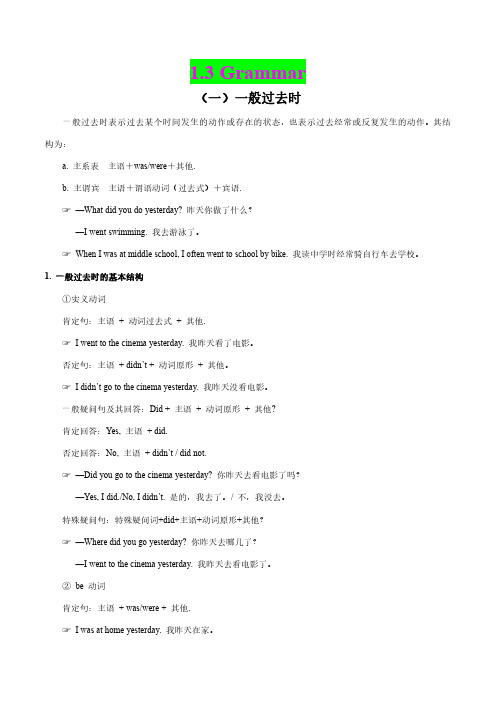
1.3Grammar(一)一般过去时一般过去时表示过去某个时间发生的动作或存在的状态,也表示过去经常或反复发生的动作。
其结构为:a.主系表主语+was/were+其他.b.主谓宾主语+谓语动词(过去式)+宾语.☞—What did you do yesterday?昨天你做了什么?—I went swimming.我去游泳了。
☞When I was at middle school,I often went to school by bike.我读中学时经常骑自行车去学校。
1.一般过去时的基本结构①实义动词肯定句:主语+动词过去式+其他.☞I went to the cinema yesterday.我昨天看了电影。
否定句:主语+didn’t+动词原形+其他。
☞I didn’t go to the cinema yesterday.我昨天没看电影。
一般疑问句及其回答:Did+主语+动词原形+其他?肯定回答:Yes,主语+did.否定回答:No,主语+didn’t/did not.☞—Did you go to the cinema yesterday?你昨天去看电影了吗?—Yes,I did./No,I didn’t.是的,我去了。
/不,我没去。
特殊疑问句:特殊疑问词+did+主语+动词原形+其他?☞—Where did you go yesterday?你昨天去哪儿了?—I went to the cinema yesterday.我昨天去看电影了。
②be动词肯定句:主语+was/were+其他.☞I was at home yesterday.我昨天在家。
否定句:主语+wasn’t/weren’t+其他.☞I wasn’t at home yesterday.我昨天没在家。
一般疑问句及其回答:Were/Was+主语+其他?☞—Were you at home yesterday?你昨天在家吗?—Yes,I was./No,I wasn’t.是的,我在家。
英语语法之一般过去时

am, is → was, are → were
主谓宾结构 Did+ 主语+ v. 原形+ 其他? Yes, 主语+did. No, 主语+didn’t. Did you go to the zoo yesterday? Yes, I did. No, I didn’t.
b.
ed cry—cried try---tried carry---carried D. 单词中只有一个元音字母,其后紧跟一 个辅音字母(重读闭音节结尾的), 双写辅 音字母再加-ed stop---- stopped swim---- swimming
一些不规则动词需要单独记忆: is—was are—were do—did go—went can—could have—had
Grammar
Байду номын сангаас
一。一般过去时 1. 意义:一般过去时用于表示过去发生的动 作或存在的状态。通常与表示过去的时间 状语连用. I go to school every day. I went to school yesterday. 2.一般过去时的构成: 主语+谓语动词的过去式+其他成分
陈述句 a.主系表结构: 主语+ was/ were + 其他. I was at home yesterday. We were at home yesterday. b. 主谓宾结构: 主语+ 动词过去式+ 其他. I went to the zoo yesterday.
E.
3.动词过去式的构成:
A.规则动词直接加- ed look----looked open---- opened ask---- asked B.以不发音e结尾的动词加d, arrive---- arrived live---lived
英语一般过去时语法知识点

英语一般过去时语法知识点英语一般过去时(Simple Past Tense)是表示过去某个时间发生或存在的动作或状态的一种时态。
以下是英语一般过去时的语法知识点:1. 句子结构:主语+ 动词过去式+ 其他成分。
2. 动词过去式的构成:- 一般情况下,直接在动词原形后面加-ed。
例如:play →played,watch →watched,want →wanted。
- 以不发音的字母“e”结尾的动词,在加-ed前先去掉“e”。
例如:live →lived,change →changed。
- 以辅音字母+y结尾的动词,将y变为i再加-ed。
例如:study →studied,carry →carried。
- 一些不规则动词的过去式需要记忆,例如:go →went,eat →ate,see →saw,do →did。
3. 动词过去式的否定和疑问形式:- 否定形式:主语+ did not + 动词原形+ 其他成分。
缩写为didn't。
例如:I didn't play tennis yesterday.- 疑问形式:Did + 主语+ 动词原形+ 其他成分例如:Did you watch the movie last night?4. 一般过去时的时间状语:昨天(yesterday)、上个月(last month)、去年(last year)等表示过去某个具体时间的时间状语。
5. 一般过去时的用法:- 表示过去某个具体时间发生的动作或状态。
例如:I went to the beach yesterday.- 表示过去一段时间内发生的动作或状态。
例如:I lived in London for two years.- 表示过去习惯性的动作或状态。
例如:When I was a child, I always played with my friends.以上就是英语一般过去时的语法知识点。
记得多加练习,熟练掌握一般过去时的用法。
2025届高考英语语法复习一般过去时知识讲解讲义
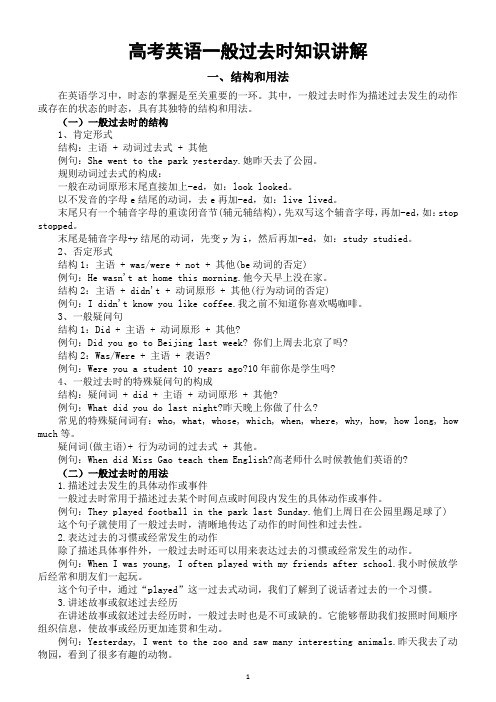
高考英语一般过去时知识讲解一、结构和用法在英语学习中,时态的掌握是至关重要的一环。
其中,一般过去时作为描述过去发生的动作或存在的状态的时态,具有其独特的结构和用法。
(一)一般过去时的结构1、肯定形式结构:主语 + 动词过去式 + 其他例句:She went to the park yesterday.她昨天去了公园。
规则动词过去式的构成:一般在动词原形末尾直接加上-ed,如:look looked。
以不发音的字母e结尾的动词,去e再加-ed,如:live lived。
末尾只有一个辅音字母的重读闭音节(辅元辅结构),先双写这个辅音字母,再加-ed,如:stop stopped。
末尾是辅音字母+y结尾的动词,先变y为i,然后再加-ed,如:study studied。
2、否定形式结构1:主语 + was/were + not + 其他(be动词的否定)例句:He wasn't at home this morning.他今天早上没在家。
结构2:主语 + didn't + 动词原形 + 其他(行为动词的否定)例句:I didn't know you like coffee.我之前不知道你喜欢喝咖啡。
3、一般疑问句结构1:Did + 主语 + 动词原形 + 其他?例句:Did you go to Beijing last week? 你们上周去北京了吗?结构2:Was/Were + 主语 + 表语?例句:Were you a student 10 years ago?10年前你是学生吗?4、一般过去时的特殊疑问句的构成结构:疑问词 + did + 主语 + 动词原形 + 其他?例句:What did you do last night?昨天晚上你做了什么?常见的特殊疑问词有:who, what, whose, which, when, where, why, how, how long, how much等。
小学英语语法详解时态-----一般过去时
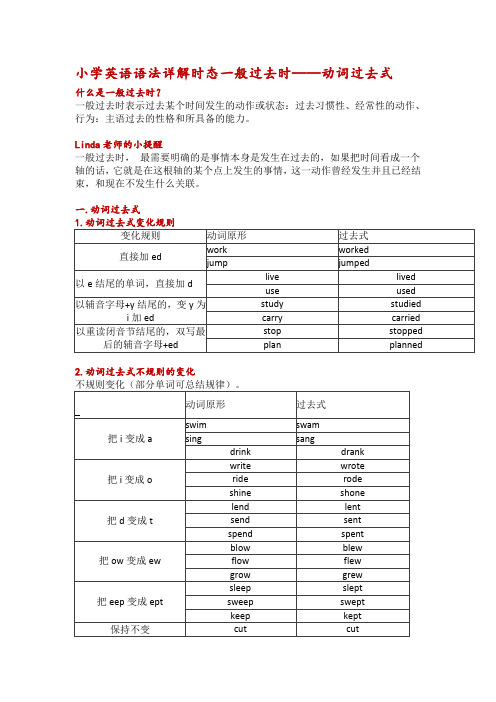
小学英语语法详解时态一般过去时——动词过去式什么是一般过去时?一般过去时表示过去某个时间发生的动作或状态:过去习惯性、经常性的动作、行为:主语过去的性格和所具备的能力。
Linda老师的小提醒一般过去时,最需要明确的是事情本身是发生在过去的,如果把时间看成一个轴的话,它就是在这根轴的某个点上发生的事情,这一动作曾经发生并且已经结束,和现在不发生什么关联。
一.动词过去式2.动词过去式不规则的变化Linda老师的小提醒★大部分过去式还是需要去记忆的:be动词的过去式一was(am,is的过去式). were(are的过去式)。
一些实义动词的过去式,dig→ dug,run→ ran,eat→ ate,fall→ fell,lie→ lay等。
★部分动词的过去式两种都是可以的,比如:lean→ leaned/leant;dream→ dreamt/dreamed;bet→ bet/betted等。
小学英语语法详解时态一般过去时——一般过去时的句式变化二.一般过去时的句式变化1.陈述句:主语+动词过去式+其他I saw the rianbow yesterday.我昨天看到了彩虹。
They went to he park last Sunday.上周日他们去了公园。
Ben got up at six this morning.本今天早上是六点起床的。
2.一般疑问句1)将be动词提到句首陈述句:It was an egg yesterday.它昨天还是一个蛋。
一般疑问句:Was it an egg yesterday?它昨天还是一个蛋吗?陈述句:They were at school just now.他们刚才还在学校。
一般疑问句:Were they at school just now?他们刚才还在学校吗?Linda老师的小提醒主语是第一人称和第二人称的句子,其过去时变化时,要注意be动词的变化。
一般疑问句:Were you at home last night?你昨天晚上在家吗?肯定回答:Yes,I was.否定回答:No,I wasn't.2)用助动词did陈述句:I did my homework at school,我在学校做了作业。
英语学习:一般过去时语法解释大全
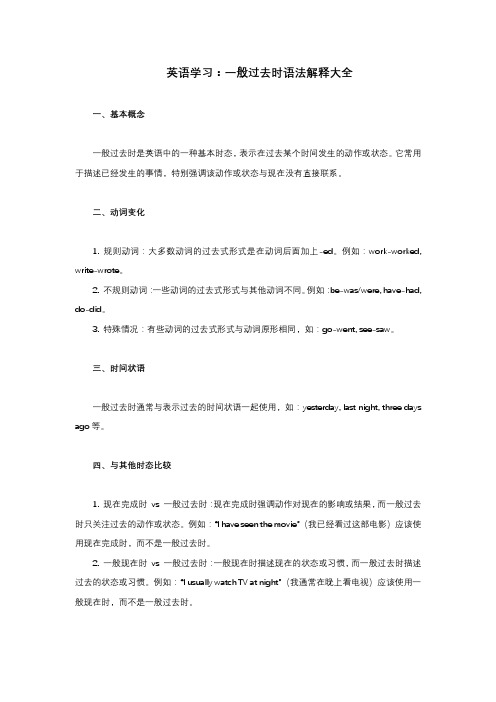
英语学习:一般过去时语法解释大全一、基本概念一般过去时是英语中的一种基本时态,表示在过去某个时间发生的动作或状态。
它常用于描述已经发生的事情,特别强调该动作或状态与现在没有直接联系。
二、动词变化1. 规则动词:大多数动词的过去式形式是在动词后面加上-ed。
例如:work-worked, write-wrote。
2. 不规则动词:一些动词的过去式形式与其他动词不同。
例如:be-was/were, have-had, do-did。
3. 特殊情况:有些动词的过去式形式与动词原形相同,如:go-went, see-saw。
三、时间状语一般过去时通常与表示过去的时间状语一起使用,如:yesterday, last night, three days ago等。
四、与其他时态比较1. 现在完成时vs 一般过去时:现在完成时强调动作对现在的影响或结果,而一般过去时只关注过去的动作或状态。
例如:“I have seen the movie”(我已经看过这部电影)应该使用现在完成时,而不是一般过去时。
2. 一般现在时vs 一般过去时:一般现在时描述现在的状态或习惯,而一般过去时描述过去的状态或习惯。
例如:“I usually watch TV at night”(我通常在晚上看电视)应该使用一般现在时,而不是一般过去时。
五、特殊用法1. 表达过去的经验:例如:“I visited Paris last year”(我去年参观了巴黎)。
2. 表达假设条件:例如:“If I were you, I would do it”(如果我是你,我会去做这件事)。
六、与过去进行时的区别1. 时间焦点:过去进行时强调在过去某一段时间正在发生的动作,而一般过去时描述过去的某个时间点发生的动作。
2. 语态选择:过去进行时用于描述过去某个时刻正在进行的动作,通常使用进行体(was/were+动词ing形式),而一般过去时则直接使用动词的过去式形式。
英语语法系列_一般过去式介绍
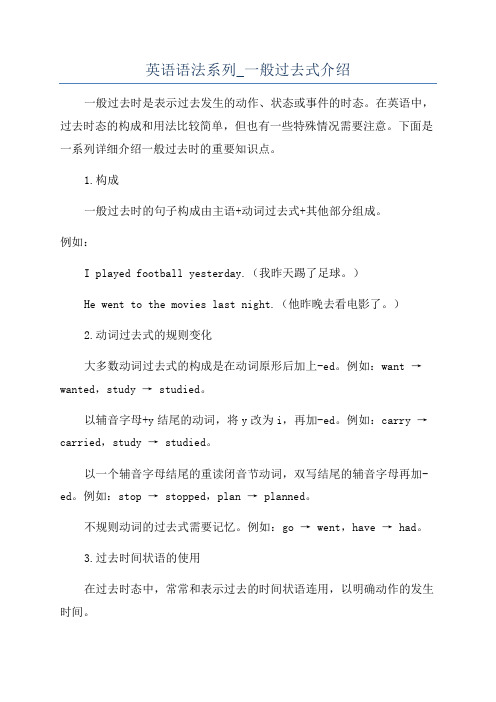
英语语法系列_一般过去式介绍一般过去时是表示过去发生的动作、状态或事件的时态。
在英语中,过去时态的构成和用法比较简单,但也有一些特殊情况需要注意。
下面是一系列详细介绍一般过去时的重要知识点。
1.构成一般过去时的句子构成由主语+动词过去式+其他部分组成。
例如:I played football yesterday.(我昨天踢了足球。
)He went to the movies last night.(他昨晚去看电影了。
)2.动词过去式的规则变化大多数动词过去式的构成是在动词原形后加上-ed。
例如:want → wanted,study → studied。
以辅音字母+y结尾的动词,将y改为i,再加-ed。
例如:carry → carried,study → studied。
以一个辅音字母结尾的重读闭音节动词,双写结尾的辅音字母再加-ed。
例如:stop → stopped,plan → planned。
不规则动词的过去式需要记忆。
例如:go → went,have → had。
3.过去时间状语的使用在过去时态中,常常和表示过去的时间状语连用,以明确动作的发生时间。
例如:yesterday(昨天),last week(上周),in 1990(在1990年)。
4.一般过去时的用法4.1表示过去的一些时间点的动作或事件。
例如:I visited Paris last month.(上个月我去了巴黎。
)They went to the park yesterday.(他们昨天去了公园。
)4.2表示过去经常发生的动作或状态。
例如:We always walked to school when we were children.(我们小时候经常走路去上学。
)She often cooked dinner for her family.(她经常给家人做晚饭。
)4.3表示过去习惯性的动作或状态。
例如:He used to live in London.(他过去住在伦敦。
(完整版)英语一般过去时语法知识归纳总结,推荐文档

Did you watch TV last night? Did you watch TV last night?
Yes, we did. No, we didn’t.
Yes, we did. No, we didn’t.
复数
我形去式人也就有人!为UR扼腕入站内信不存在向你偶同意调剖沙龙课反倒是龙卷风前一天
情况
构成方法
一般情况
加 -ed
以 e 结尾的词
加 -d
以重读闭音节结尾的词
先双写最后的辅音字母 再加 -ed
以元音字母 + y 结尾的词 加 -ed
以辅音字母 + y 结尾的词 把 y 改成 i 再加-ed
读音 元音后面读[t] 清辅音后读[t] 浊辅音后读[d] 在[t]、[d]音后面[id]
例词
TV
His brother last night.
didn’t watch
TV
Did his brother watch TV last night?
Yes, he did. No, he didn’t.
第三 人称
Mike night.
watched
TV
last Mike didn’t night.
5. 在谈到已死去的人的情况时多用过去时。
Lei Feng was a good soldier.
雷锋是个好战士。
6. 一般过去时常与表示过去的时间状语连用。大体可分为如下几类:
⑴ yesterday、the day before yesterday (前天)、the other day (前几天)、in the old days (在过去的日子里)
单
第三 人称
英语一般过去时语法知识点总结(完整版)这一篇就够了

英语一般过去时语法知识点总结(笔记完整版)这一篇就够了1 一般过去时的定义总结1.1 描述发生在过去时间的事情或者动作。
The meeting started at 9 o’clock. 会议在9点就开始了。
1.2 表示在过去时间所存在的状态。
I was sick last month. 我上个月生病了。
1.3 表示发生在过去,但是已经结束的事件或者动作。
We had hamburger for lunch. 我们午饭吃了汉堡。
看下面表格区分一般过去时一般现在时和一般将来时一般过去时I was two years old then. 我那时候2岁。
一般现在时I am two years old now. 我现在2岁。
一般将来时I will be two years old next Monday. 到下周一我就2岁了。
2. 一般过去时的表现/结构形式。
在汉语中表示过去只需要说时间就可以了,过去的时间就表示过去。
比如,我昨天吃汉堡了。
就表示过去但是在英语中,表示过去除了加时间(有时候也不加),还需要在动词上体现出来。
具体有2种表现形式。
一种是在Be动词上体现,一种是在实义动词(能够独立做谓语的动词)上体现。
2.1 Be动词的一般过去时Be动词的一般过去时视主语不同,有2种was/were。
主语为单数或者我时,用was。
I was two years old last year. 我去年2岁She was two years old last year. 她去年2岁主语为复数或你时用were。
We were in the library this morning。
早上我们在图书馆You were thin last year。
你去年比较苗条。
Be动词过去时的肯定及否定肯定句结构:主语+was/were +否定句结构:主语+was/were +not+否定与的缩写结构was not = wasn’t , were not = weren’t例句:翠花去年是个胖子Cuihua was fat last year.翠花去年不胖Cuihua was not(wasn’t) fat last year.Be 动词过去时的一般疑问句,与常规一般疑问句一样,把Be动词提前即可。
英语语法大攻克--一般过去时的构成及用法

一般过去时的构成及用法:一、一般过去时的用法:1. 表示过去的动作或状态,常和明确的过去时间状语连用,如:yesterday, last week, three days ago, in 1998,just now等,或与由when引导的从句连用。
2. 也可以表示过去某一段时间内经常或反复出现的动作。
句子中常带有every day, often, usually, always, sometimes等时间状语。
例:When I worked in the company, I got up early every morning.在那家公司上班时,我每天早晨都起得很早。
In the past few years she usually went touring during her summer holidays.在过去的几年里,每逢暑假她总是出去旅游。
二、一般过去时的形式to be:第一人称单数和第三人称单数用was, 其余的人称用were。
to do(行为动词):行为动词的过去式有两类,一类是规则动词,另一类是不规则动词。
to have: 各人称,单、复数一律用had。
肯定句否定句be I /He/She/It was... I/ He /She/It was not ...We/You/They were... We /You/They were not...have I /He/She/It/ We/You/They had... I/ He /She/It/We/You/They had not(有)...I/He/She/It/We/You/They did not have(吃/喝/进行...)…行为动词I /He/She/It/ We/You/Theystudied…I/ He /She/It/ We /You/They did not study…一般疑问句简略回答be Was he/she/it...? Yes,he was.(No,he wasn’t.)Were we/you/they...? Yes,you were. (No,you were not)have Had I/he/she/it/you/we/ they...?Did I/you/he... have... Yes,you had.(No,you hadn’t.) Yes,you did.(No,you didn’t.)行为动词Did he/she/ it/ we/you/ theystudy..?Yes,you did.(No,you didn’t.)I. 一般过去时的概念一般过去时表示过去某个时间发生的动作或存在的状态。
英语语法大攻克--直接引语变间接引语(时间地点状语的转变)

直接引语变间接引语(时间地点状语的转变)但要注意在以下几种情况下,在直接引语变为间接引语时,时态一般不变化。
①直接引语是客观真理或是谚语格言时,如:"The earth moves around the sun and the moon moves around the earth, the teacher told me. → The teacher told me the earth moves around the sun and the moon moves around the earth。
He said,“Practice makes perfect.” ——>He said that practice makes perfect.②直接引语是过去进行时,时态不变。
如:Jack said, "John, where were you going when I met you in the street?" →Jack asked John where he was going when he met him in the street。
③直接引语中有具体的过去某年、某月、某日作状语,变为间接引语时,时态不变。
如:Xiao Wang said. "I was born on April 2l, 1980。
" →Xiao Wang said he was born on April 20, 1980。
④直接引语如果是一般现在时,表示一种反复出现或习惯性的动作,变间接引语,时态不变。
如:He said, "I get up at six every morning。
" →He said he gets up at six every morning。
⑤如果直接引语中的情态动词没有过去时的形式(例:ought to,had better, used to)和已经是过去时的形式时,(例:could, should, would, might)不再变。
英语语法大攻克--一般过去时态
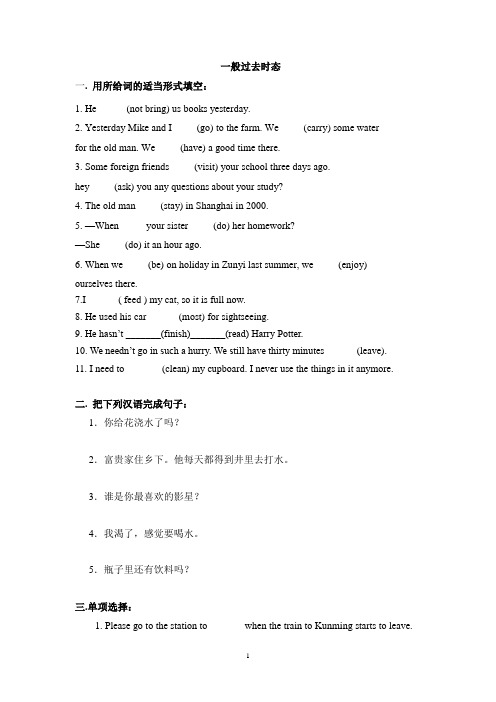
一般过去时态一. 用所给词的适当形式填空:1. He _____ (not bring) us books yesterday.2. Yesterday Mike and I_____(go) to the farm. We_____(carry) some waterfor the old man. We_____(have) a good time there.3. Some foreign friends_____(visit) your school three days ago._____hey_____(ask) you any questions about your study?4. The old man_____(stay) in Shanghai in 2000.5. —When_____ your sister_____(do) her homework?—She_____(do) it an hour ago.6. When we_____(be) on holiday in Zunyi last summer, we_____(enjoy) ourselves there.7.I ______( feed ) my cat, so it is full now.8. He used his car ______(most) for sightseeing.9. He hasn’t _______(finish)_______(read) Harry Potter.10. We needn’t go in such a hurry. We still have thirty min utes ______(leave).11. I need to _______(clean) my cupboard. I never use the things in it anymore.二. 把下列汉语完成句子:1.你给花浇水了吗?2.富贵家住乡下。
英语语法-一般过去时态
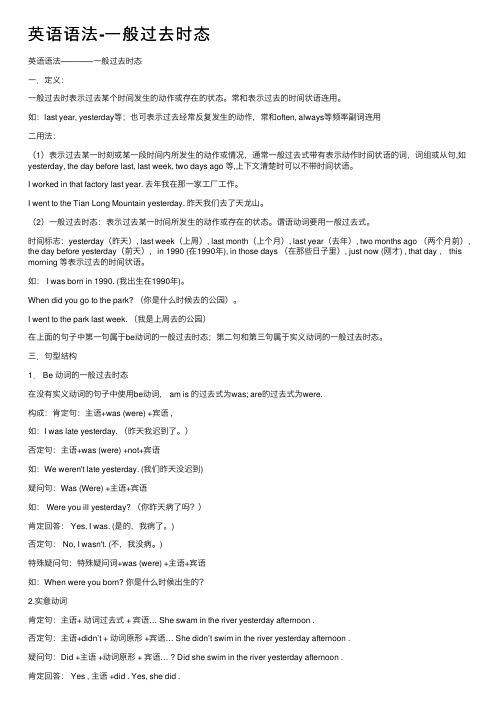
英语语法-⼀般过去时态英语语法————⼀般过去时态⼀.定义:⼀般过去时表⽰过去某个时间发⽣的动作或存在的状态。
常和表⽰过去的时间状语连⽤。
如:last year, yesterday等;也可表⽰过去经常反复发⽣的动作,常和often, always等频率副词连⽤⼆⽤法:(1)表⽰过去某⼀时刻或某⼀段时间内所发⽣的动作或情况,通常⼀般过去式带有表⽰动作时间状语的词,词组或从句,如yesterday, the day before last, last week, two days ago 等,上下⽂清楚时可以不带时间状语。
I worked in that factory last year. 去年我在那⼀家⼯⼚⼯作。
I went to the Tian Long Mountain yesterday. 昨天我们去了天龙⼭。
(2)⼀般过去时态:表⽰过去某⼀时间所发⽣的动作或存在的状态。
谓语动词要⽤⼀般过去式。
时间标志:yesterday(昨天), last week(上周), last month(上个⽉), last year(去年), two months ago (两个⽉前), the day before yesterday(前天),in 1990 (在1990年), in those days (在那些⽇⼦⾥), just now (刚才) , that day , this morning 等表⽰过去的时间状语。
如: I was born in 1990. (我出⽣在1990年)。
When did you go to the park? (你是什么时候去的公园)。
I went to the park last week. (我是上周去的公园)在上⾯的句⼦中第⼀句属于be动词的⼀般过去时态;第⼆句和第三句属于实义动词的⼀般过去时态。
三.句型结构1. Be 动词的⼀般过去时态在没有实义动词的句⼦中使⽤be动词, am is 的过去式为was; are的过去式为were.构成:肯定句:主语+was (were) +宾语 ,如:I was late yesterday. (昨天我迟到了。
英语一般过去时语法知识归纳总结
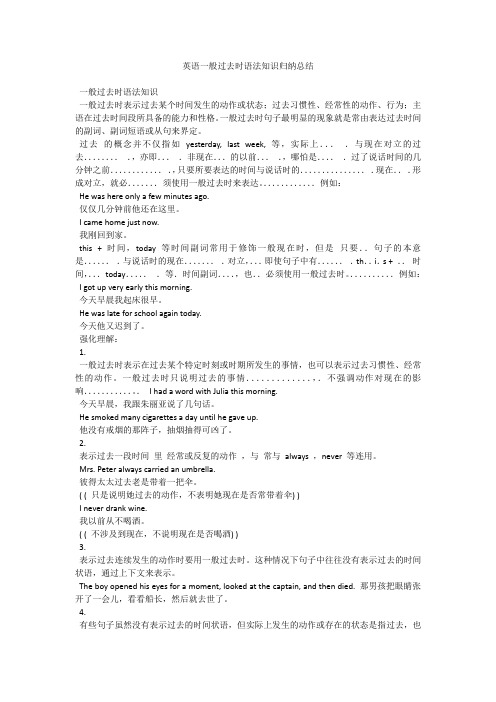
英语一般过去时语法知识归纳总结一般过去时语法知识一般过去时表示过去某个时间发生的动作或状态;过去习惯性、经常性的动作、行为;主语在过去时间段所具备的能力和性格。
一般过去时句子最明显的现象就是常由表达过去时间的副词、副词短语或从句来界定。
过去的概念并不仅指如yesterday, last week, 等,实际上....与现在对立的过去.........,亦即....非现在...的以前....,哪怕是.....过了说话时间的几分钟之前.............,只要所要表达的时间与说话时的................现在...形成对立,就必.......须使用一般过去时来表达。
............例如:He was here only a few minutes ago.仅仅几分钟前他还在这里。
I came home just now.我刚回到家。
this + 时间,today 等时间副词常用于修饰一般现在时,但是只要..句子的本意是.......与说话时的现在........对立,...即使句子中有.......th..i.s + ..时间,...today......等.时间副词....,也..必须使用一般过去时。
..........例如:I got up very early this morning.今天早晨我起床很早。
He was late for school again today.今天他又迟到了。
强化理解:1.一般过去时表示在过去某个特定时刻或时期所发生的事情,也可以表示过去习惯性、经常性的动作。
一般过去时只说明过去的事情.............,.不强调动作对现在的影响...........。
.I had a word with Julia this morning.今天早晨,我跟朱丽亚说了几句话。
He smoked many cigarettes a day until he gave up.他没有戒烟的那阵子,抽烟抽得可凶了。
英语语法大攻克--一般过去时 (2)

一般过去时1.一般过去时表示过去某个时间发生的动作或存在的状态,常和表示过去的时间状语连用。
一般过去时也表示过去经常或反复发生的动作感谢。
2.Be动词在一般过去时中的变化:⑴am 和is在一般过去时中变为was。
(was not=wasn’t)⑵are在一般过去时中变为were。
(were not=weren’t)⑶带有was或were的句子,其否定、疑问的变化和is, am, are一样,即否定句在was或were 后加not,一般疑问句把was或were调到句首。
3.句中没有be动词的一般过去时的句子否定句:didn’t +动词原形,如:Jim didn’t go home yesterday.一般疑问句:在句首加did,句子中的动词过去式变回原形。
如:Did Jim go home yesterday? 特殊疑问句:⑴疑问词+did+主语+动词原形?如:What did Jim do yesterday?⑵疑问词当主语时:疑问词+动词过去式?如:Who went to home yesterday?动词过去式变化规则:1.一般在动词末尾加-ed,如:pull-pulled, cook-cooked2.结尾是e加d,如:taste-tasted3.末尾只有一个元音字母和一个辅音字母的重读闭音节,应双写末尾的辅音字母,再加-ed,如:stop-stopped4.以“辅音字母+y”结尾的,变y为i,再加-ed,如:study-studied5.不规则动词过去式:am, is-was, are-were, do-did, see-saw, say-said, give-gave, get-got, go-went, come-came, have-had, eat-ate, take-took, run-ran, sing-sang, put-put, make-made, read-read, write-wrote, draw-drew, drink-drank, fly-flew, ride-rode, speak-spoke, sweep-swept, swim-swam, sit-sat过去时练习:写出下列动词的过去式is\am_________ fly_______ plant________ are ________ drink_________play_______ go________ make ________ does_________ dance________worry________ ask _____ taste_________ eat__________ draw________put ______ throw________ kick_________ pass_______ do ________Be动词的过去时练习一、用be动词的适当形式填空。
英语一般过去时语法知识讲解
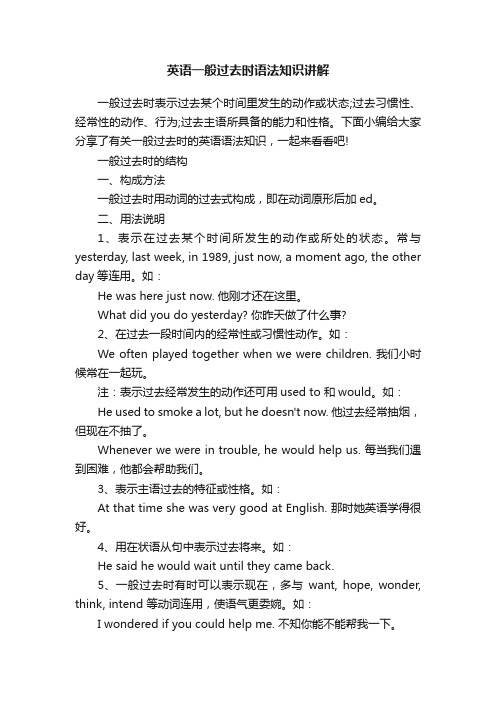
英语一般过去时语法知识讲解一般过去时表示过去某个时间里发生的动作或状态;过去习惯性、经常性的动作、行为;过去主语所具备的能力和性格。
下面小编给大家分享了有关一般过去时的英语语法知识,一起来看看吧!一般过去时的结构一、构成方法一般过去时用动词的过去式构成,即在动词原形后加ed。
二、用法说明1、表示在过去某个时间所发生的动作或所处的状态。
常与yesterday, last week, in 1989, just now, a moment ago, the other day等连用。
如:He was here just now. 他刚才还在这里。
What did you do yesterday? 你昨天做了什么事?2、在过去一段时间内的经常性或习惯性动作。
如:We often played together when we were children. 我们小时候常在一起玩。
注:表示过去经常发生的动作还可用used to 和would。
如:He used to smoke a lot, but he doesn't now. 他过去经常抽烟,但现在不抽了。
Whenever we were in trouble, he would help us. 每当我们遇到困难,他都会帮助我们。
3、表示主语过去的特征或性格。
如:At that time she was very good at English. 那时她英语学得很好。
4、用在状语从句中表示过去将来。
如:He said he would wait until they came back.5、一般过去时有时可以表示现在,多与want, hope, wonder, think, intend 等动词连用,使语气更委婉。
如:I wondered if you could help me. 不知你能不能帮我一下。
6、有时用一般过去时也是时态一致的需要。
英语语法大攻克--四类基本时态练习
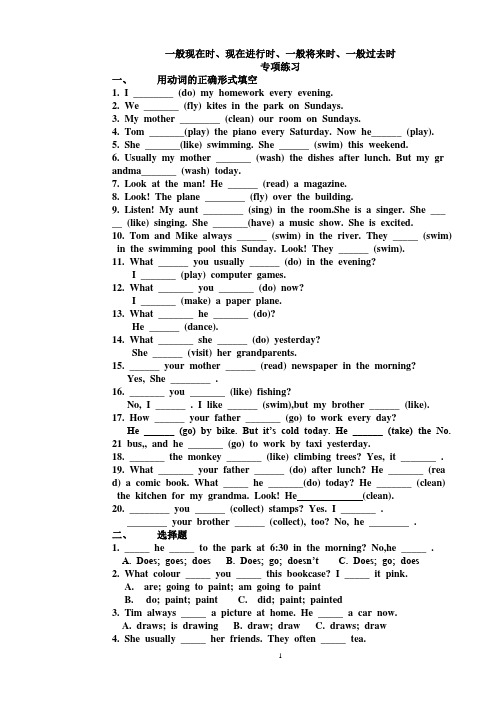
一般现在时、现在进行时、一般将来时、一般过去时专项练习一、用动词的正确形式填空1. I ________ (do) my homework every evening.2. We _______ (fly) kites in the park on Sundays.3. My mother ________ (clean) our room on Sundays.4. Tom _______(play) the piano every Saturday. Now he______ (play).5. She _______(like) swimming. She ______ (swim) this weekend.6. Usually my mother _______ (wash) the dishes after lunch. But my gr andma_______ (wash) today.7. Look at the man! He ______ (read) a magazine.8. Look! The plane ________ (fly) over the building.9. Listen! My aunt ________ (sing) in the room.She is a singer. She ___ __ (like) singing. She _______(have) a music show. She is excited.10. Tom and Mike always ______ (swim) in the river. They _____ (swim) in the swimming pool this Sunday. Look! They ______ (swim).11. What ______ you usually ______ (do) in the evening?I _______ (play) computer games.12. What _______ you _______ (do) now?I _______ (make) a paper plane.13. What _______ he _______ (do)?He ______ (dance).14. What _______ she ______ (do) yesterday?She ______ (visit) her grandparents.15. ______ your mother ______ (read) newspaper in the morning?Yes, She ________ .16. _______ you _______ (like) fishing?No, I ______ . I like ______ (swim),but my brother ______ (like). 17. How ______ your father _______ (go) to work every day?He ______ (go) by bike. But it’s cold today. He ______ (take) the No.21 bus,, and he _______ (go) to work by taxi yesterday.18. _______ the monkey _______ (like) climbing trees? Yes, it _______ .19. What _______ your father ______ (do) after lunch? He _______ (read) a comic book. What _____ he _______(do) today? He _______ (clean) the kitchen for my grandma. Look! He (clean).20. ________ you ______ (collect) stamps? Yes. I _______ .________ your brother ______ (collect), too? No, he ________ .二、选择题1. _____ he _____ to the park at 6:30 in the morning? No,he _____ .A. Does; goes; doesB. Does; go; doesn’tC. Does; go; does2. What colour _____ you _____ this bookcase? I _____ it pink.A. are; going to paint; am going to paintB. do; paint; paintC. did; paint; painted3. Tim always _____ a picture at home. He _____ a car now.A. draws; is drawingB. draw; drawC. draws; draw4. She usually _____ her friends. They often _____ tea.A. see; drinkB. sees; drinksC. sees; drink5. He usually _____ the dishes at night, but tonight he _____ clothes.A. wash; washB.washes; is going to washC. is washing; washes6. Mr. Green usually _____ his newspaper in the evening, but he and hi s wife _____ television yesterday evening.A.reads; watchesB.reads; is going to watchC.reads; watched7. Where are the man and the woman? They _____ near the tree.A. sitB. satC. are sitting8. _____ your penpal _____ diving? No, he _____ .He ______ writing sto ries.A. Does; like; doesn’t; likesB. Does; likes; doesn’t; likeC. Do; like; don’t; likes9. _____ you _____ fishing yesterday? No, we _____ .A. Doe s; go; doesn’tB. Did; go; didn’tC. Do; go; don’t10. Open the window, Please. Look! He _____ it.A. opensB. is openningC. is opening11. I usually _____ some milk every day. But I _____ coffee yesterday.A. drink; drankB. is drinking; drinkC. drank; am drinking12. Mr. Green often _____ his newspapers at night. But he _____ an interesting book tonight.A. reads; readsB. reads; readC. reads; is going to read13. The old man _____ playing sports in the park. He _____ morning exercise now.A. likes; is doingB. likes; doesC. like; doing14. What ____you usually _____in the evening? I _____computer games.What _____ you _____ last night? I _____ a book.A. do; do; playB. did; do; playedC. does; do; playsdid; do; read do; do; read do; do; am reading15. Where ______ the boy _____ ? He _____ across the river now.A. does; swim; swimsB. is; swimming; is swimmingC. is; swimming; is swimming16. _____ you _____ to music now? Yes, we _____ .A. Do; listen; doB. Did; listen; didC. Are; listening; are17. Put on you coat, please. OK. I ______ it on.A. am puttingB. am going to putC. put18. _____ you ______ coffee? Yes, I ______ .A. Do; like; doB. Did; like; didC. Are; like; am19. Look! Two cats ______ across the wall.A. runB. runsC. are running20. She _____ tea, but he _____ .A. likes; doesn’t B; like; don’t C. like; doesn’t。
- 1、下载文档前请自行甄别文档内容的完整性,平台不提供额外的编辑、内容补充、找答案等附加服务。
- 2、"仅部分预览"的文档,不可在线预览部分如存在完整性等问题,可反馈申请退款(可完整预览的文档不适用该条件!)。
- 3、如文档侵犯您的权益,请联系客服反馈,我们会尽快为您处理(人工客服工作时间:9:00-18:30)。
一般过去时一般过去时由动词的过去式表示,表示过去发生的动作或状态。
过去式分为规则变化和不规则变化。
一般过去时的构成:a. be动词过去式的句式。
否定句是在was/were后面加not,was not (wasn't)/were not (weren't)。
一般疑问句是把was / were提前并放到句首,要求首字母要大写。
b.实义动词过去式的句式。
①肯定式:主语+动词过去式+其它。
如:They had a good time yesterday.②否定式:主语+did not(didn't)+动词原形+其它。
如:They didn't watch TV last night.③一般疑问句:Did+主语+动词原形+其它?肯定回答:Yes,主语+did.否定回答:No,主语+didn't.如:Did they have a meeting two days ago? Yes,they did. / No,they didn't.④特殊疑问句:特殊疑问词+did+主语+动词原形+其它?如:What time did you finish your homework?一般过去时的用法:①一般过去时的基本用法a)表示过去某个特定时间发生的动作或存在的状态。
He suddenly fell ill yesterday.昨天他突然生病了。
The engine stopped because the fuel was used up.发动机因燃料用光而停机了。
b)表示过去经常发生的动作或存在的状态。
I wrote home once a week at college.我上大学时每周给家里写一封信。
He was already in the habit of reading widely in his boyhood.他童年时就养成了广泛阅读的习惯。
注:表示过去的习惯性动作,除了用过去时外,还可以用used to或would来表示。
She used to study late into the night when she was in Senior Three.她上高三时经常学习到深夜。
He would sit for hours doing nothing.过去他常常一坐几个钟头什么事也不做。
c)表示过去连续发生的一系列动作。
She entered the room, picked up a magazine and looked through it carefully.她走进房间,拿起一本杂志,认真地翻阅了起来。
The students go up early in the morning, did morning exercises and then read English aloud in the open air.学生们很早起床,做早操,然后在室外朗读英语。
d)在时间、条件状语从句中表示过去将要发生的动作。
We would not leave until the teacher came back.老师回来我们才会离开。
She told me she would not go if it rained the next day.她告诉我如果第二天下雨的话,她就不去了。
②一般过去时的特殊用法a)在虚拟语气中表示现在或将来时间的动作或状态。
It's time we went.该是我们走的时候了。
I wish I were twenty years younger.但愿我年轻20岁。
I would rather you didn't do anything for the time being.我宁愿你暂时先不要采取什么措施。
b)在口语中,一般过去时往往显示委婉客气。
I wondered if you could give me a hand.我想请你帮个忙。
Might I come and see you tonight?我想今晚来看你,好吗?一般过去时的时间状语表示一般过去时的时间状语有:a moment ago(刚才),yesterday morning,last night/ week,the day before yesterday(前天),just now(刚才)等。
动词一般过去式的构成a.规则动词过去式的变化可速记为直、去、双、改四字诀。
①一般情况下在动词原形后直接加-ed。
如:wanted,played。
②以不发音的字母e结尾的动词,去掉e再加-ed。
如:hoped,lived。
③重读闭音节单词需双写最后一个辅音字母再加-ed。
如:stopped。
④以辅音字母+y结尾的动词变y为i,再加-ed。
如:studied,worried。
规则动词过去式的读音也有规律可循。
请记住:清后[t],元浊[d],[t] [d]之后读[Id]。
①清辅音[p] [k] [f] [s] [F] 等后,ed要读[t]。
如:worked,finished。
②元音或浊辅音[b] [g] [v] [z] [m]等后,ed要读[d]。
如:lived,called。
③[t]或[d]后,ed读[Id]。
如:started,needed。
b.不规则动词变化,要逐一熟记。
be动词过去式有两种形式,主语是第一、三人称单数形式使用was,其他人称用were。
注意事项:A) 注意时间状语的搭配。
一般过去时的时间状语应该是表示过去某个时间的词或词组,如:yesterday, last month, in 1999, two days ago等,绝对不可与recently, in the past 10 years, this month等连用,因为这样的时间状语都与现在有关系,应该用现在完成时或一般现在时。
B) used to do的否定形式和疑问形式很特别:你怎么写都正确。
以否定形式为例:used not to do, didn't used to do, didn't use to do都对。
Used to do经常与be used to doing sth/ sth结构进行对比。
前者表示"过去常常或过去曾经",要求加动词原形;后者表示"习惯于",要求加名词或动名词。
一、句型转换1. There were about nine hundred people at the concert.否定句:__________________________________________一般疑问句:________________________________________对划线部分提问:____________________________________2. Ann did her homework yesterday evening.否定句:__________________________________________一般疑问句:________________________________________对划线部分提问:____________________________________3. Last week I read an English book.否定句:__________________________________________一般疑问句:________________________________________肯定/否定回答:____________________________________对划线部分提问:____________________________________二、写出下列动词的过去式形式go _______enjoy _______buy _______ eat _______get _______ walk _______take _______ dance ________write _______ run _______ _______swim _______ find _______begin _______ study _______三、用所给词的适当形式填空。
1. Tom and Mary ___________ (come) to China last month.2. Mike _________________(not go) to bed until 12 o'clock last night.So he ______ (get) up late.3. Mary __________ (read) English yesterday morning.4. Tom ___________ (begin) to learn Chinese last year.5. My mother ________________ (not do) housework yesterday.6. There ____________ a telephone call for you just now. (be)7. -When _______ you _________ (come) to china?-Last year.8. _________ (be) it cold in your city yesterday?9. How many people ________ (be) there in your class last term?10. There ________ (be) a football match on TV yesterday evening, but I _________ (have) no time to watch it.四、改错题(请改正每个句子中的一个错误)1.How is Jane yesterday? _________________________________________ 2.He go to school by bus last week. ________________________________ 3.He goes home at 6:00 last month. ________________________________ 4.I can fly kites seven years ago. ___________________________________ 5.Did you saw him just now. _______________________________________ 6.Tom wasn't watch TV last night. ________________________________7.I did not my homework yesterday. _______________________________8.He wait for you three hours ago. _________________________________ 9.Who find it just now? ____________________________________________五. 翻译下列句子1. 我过了一个忙碌但却刺激的周末。
